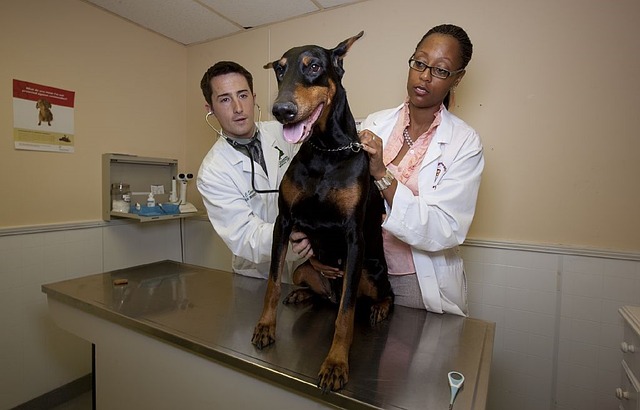
It’s a moment every pet parent dreads: your dog has been diagnosed with a serious illness.
While your veterinarian does her best to explain the disease, treatment options and prognosis, your head spins with questions: Is my dog suffering? Can my family handle the emotional strain? How much will all this cost?

Dr. Nancy Kay is a veterinarian and the author of Speaking for Spot: Be the Advocate Your Dog Needs for a Happy, Healthy, Longer Life.
She says that being a successful medical advocate for your pet involves “gathering all the medical information you need to weigh all the pros and cons of options in order to make the best decision for you and your pet. It also involves taking into consideration your pet – their personality and what they would want, as well as your own peace of mind. Being an effective medical advocate results in the best decision for the pet and the greatest long term peace of mind for you.”

When faced with a complicated illness, your dog needs more than just unconditional love. She needs an advocate who can speak up on her behalf and ensure that she gets the best treatment possible. The following tips will help keep you centered so you can focus on your dog’s health.
Get Important Details In Writing
Have you ever heard of the Rule of Seven? Marketing experts believe that a person must hear the same information seven times in order to truly retain it. When you add the strain of hearing bad news, the chances of absorbing your veterinarian’s words become even smaller.
Ask your vet to provide the important details of your pet’s illness and treatment plan in writing so you can review it later when the shock wears off.

Educate Yourself
The internet can be a tricky tool. With so much information out there, blindly researching your dog’s condition could cause more stress and confusion than you are already feeling. Instead of a general Google search, ask your veterinarian to recommend specific sites or provide helpful handouts on the subject. This will ensure that you are only exposed to the most accurate and helpful information.

Consider a Second Opinion
Asking for a referral to a specialist in the specific area of your dog’s illness is perfectly acceptable and not at all a reflection on your current vet. Medical doctors confer with one another on difficult cases all the time and almost always bring in a specialist for life-threatening conditions.
Since most veterinarians are general practitioners, seeking out a clinician with more direct experience and/or an advanced degree in a specific area of veterinary science allows you to better explore your options and make informed decisions.

Don’t Go It Alone
Providing care to a sick loved one – including a pet – is extremely stressful. Caregivers often experience bouts of depression, grief, and exhaustion from lack of self care. Surround yourself with a network of friends, family or even an online support group. Compassionate people who care about you and have been through similar situations can provide helpful advice, a shoulder to cry on, and most importantly, remind you to take care of yourself first.

Set Limitations
When dealing with a serious illness in your pet, it is important to decide how much time, money and effort you are willing and able to invest. Once you have learned all you can about your dog’s condition, sit down with your veterinarian and family to discuss these factors.
Take into account the other demands on your time such as work, school, kids, etc., and decide how much of a financial burden you are able to take on to pay for care.
It is also important to consider your dog’s personality. An outgoing, laid-back pooch is far more likely to handle frequent veterinary treatments than a dog that suffers from fear and anxiety.
You can always readjust your treatment plans as your pet’s condition changes, but establishing goals and limitations for your pet’s care can help you avoid having to make difficult decisions during an emergency.

Define Quality Of Life
Some pet owners become so focused on keeping their beloved pet by their side that they forget to consider what is best for the animal. While it is understandable to want to fight for your dog, you must also consider her quality of life. Is she suffering? Are her symptoms manageable? Does she still enjoy her favorite treats and activities?
To help pet owners objectively determine when it is time to say goodbye, Dr. Alice Villalobos, DVM, created a Quality of Life Scale that has been adopted by veterinarians all over the world. The pet owner is asked to assign a score of 0 – 10 for each of the following categories:
- Hurt – Is she in pain? Can that pain be adequately controlled with medication?
- Hunger – Does she still enjoy eating? Can she keep food down?
- Hydration – Many conditions cause dehydration which can greatly decrease quality of life
- Hygeine – Can she be kept brushed and cleaned? Is the coat matted? Is she incontinent?
- Happiness – Is she able to experience joy or mental stimulation? Does she still seek out your attention?
- Mobility – Can she get up and move around comfortably? Can she still go for walks or at least go out to potty?
- More Good Days Than Bad
A total score of 35 or higher indicates an “acceptable” quality of life. If the score is below 35, it may be time to consider humane euthanasia.

Acting as your sick pet’s medical advocate is a difficult job. Remember to use all the resources available to you so you can feel comfortable and confident in your decisions.
Featured Image via Flickr/Lwp Kommunikáció
–
via Whisker Therapy